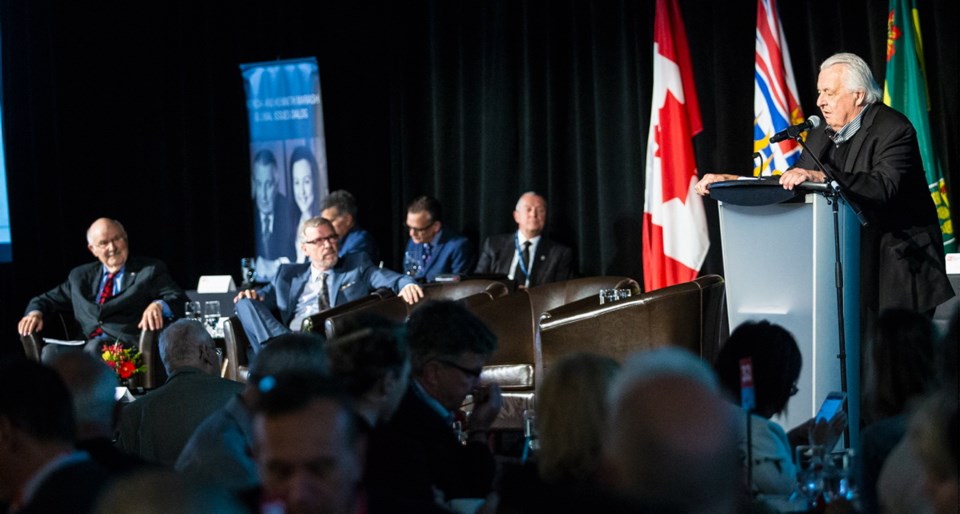The B.C. speculation tax will fail in its aim to improve housing supply and is helping destroy the province’s reputation as a place to do business, politicians from the left and right said Tuesday.
Mike Harcourt, New Democrat premier of B.C. from 1991 to 1996, and the more conservative-leaning Brad Wall, Saskatchewan premier from 2007 to earlier this year when he stepped down, were both critical of the new tax.
“There are some aspects of the speculation tax we need to have a second look at,” Harcourt said.
Wall said he knows people in Swift Current, Sask., who have purchased a second home in B.C. and are now feeling nervous.
“B.C. is starting to mean ‘bring cash’,” Wall said.
Both men were speaking at a gala-style luncheon event at the Roundhouse at Bayview Place, part of a new 2,000 unit development by Focus Equities owned by developer Ken Mariash. Tickets were $35, with all proceeds going to the United Nations Association in Canada.
The luncheon event was billed as a forum with discussion about B.C. housing issues, taxes, affordability, upcoming trends and the speculation tax — billed as H.I.T. for Housing Insanity Tax.
The tax will be applied to the 2018 tax year and is meant to discourage the buy-up of housing by investors who subsequently leave homes empty. A homeowner can avoid the tax by living in or renting out the home for six months a year.
In response to the criticism from the event, B.C. Finance Minister Carole James said she thought it unfortunate the UN Association of Canada is associated with misinformation.
In an emailed statement, James said some people are “fearmongering” because they want to sell properties in B.C.’s urban centres to offshore millionaires.
“That is not the approach British Columbians want,” James said. “Rather, the speculation tax helps to ensure that people who live and work in B.C. can find a place to call home.”
But another event speaker, Victoria Mayor Lisa Helps, said she has met with municipal counterparts and they are now working on an alternative tax they hope to present to provincial politicians.
Helps said increasing the capital gains tax would be a better way of raising money from speculators. Such a tax would be collected when a property changes hands for an increase in price.
But she agreed housing is an issue that had to be addressed for the sake of all B.C.
“We are not going to continue to enjoy the prosperity we have now unless we crack this housing nut,” Helps said.
On the event’s panel of experts, Michael Ferreira, managing principal of Urban Analytics, illustrated the current lack of housing supply with two figures.
Ferreira said at the end of 2014, Vancouver had 2,100 unsold townhomes or condominiums. At the end of the first quarter of 2018, there were 89.
He also said he has seen rises and falls in the housing market. The current time, however, is made different by one thing — social media — and the platforms offer loud voices.
“And politicians tend to listen to those sometimes loud voices,” Ferreira said.
Wall said the overall brand of B.C. has already suffered even before the new tax.
He said the cancelling of the Northern Gateway pipeline and the troubles faced by Kinder Morgan have taken their tolls. B.C. should ask itself what effect on its brand the new tax will have.
“Does it send out the best message about the brand of this province?” Wall asked.
But Harcourt was more upbeat about the future.
He said the world’s population is expected to reach 10 billion by 2050, and that will force cities to react. He said at least $350 trillion in investment would be required worldwide.
“The opportunity for work and employment is huge,” Harcourt said. “It [housing] is not a crisis, it’s a condition and it’s going to be with us for a very long time,” he said.



